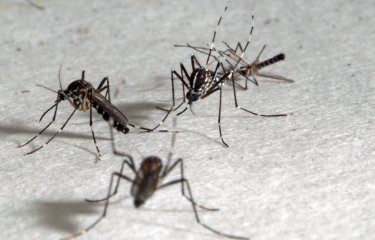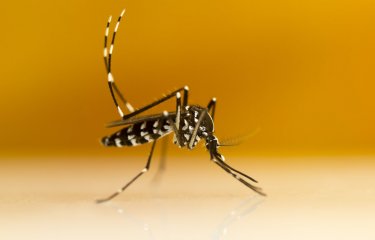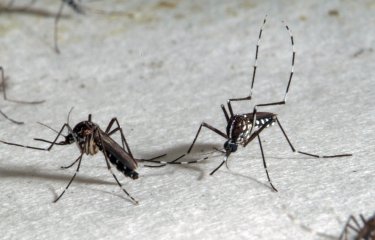At the Institut Pasteur, Sarah Merkling's research focuses on a topic that is still largely unknown: interactions between mosquitoes and viruses. She boldly devises novel strategies based on state-of-the-art technologies. Her aim is to combat diseases like dengue and Zika, which are gaining ground and currently represent a threat for more than 50% of the world's population.
Sarah Merkling had never dreamed of becoming a scientist – until the day when, as a young student, she was blown away by a biology class about genetics. Thank you Mrs. Hol, the biology teacher at Sarah's high school in Wissembourg, Alsace! That clinched it – Sarah would focus her studies on understanding the living world.
Driven by a deep curiosity and passion for her subject, Sarah chose to focus her PhD on Drosophila, the tiny fruit flies that have revolutionized biology. She then turned her attention to a creature that is much more hostile to humans: the Aedes aegypti mosquito, the main vector for dengue, Zika and yellow fever.
Training AI while maintaining a critical mindset!
In her laboratory today, Sarah Merkling is fighting a battle: her goal is to understand how some mosquitoes (but not others) become carriers for terrible viruses.
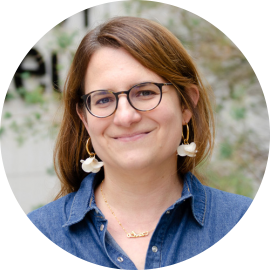
My aim is to develop and harness technological progress to reveal the basic principles governing mosquito-virus interactions
This ambition has led her to collaborate with the Institut Pasteur's BioInformatics Hub and mathematician Laura Cantini. Sarah wants to analyze the 8,000 cells that make up the mosquito's stomach, which are gateways for the virus.
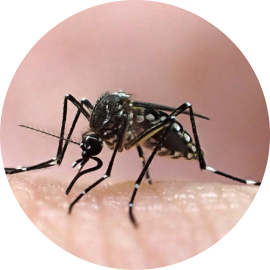
It all begins in the mosquito's stomach! That's where it all happens. We can use state-of-the-art technologies to analyze every cell and identify factors involved in the entry and proliferation of viruses.
This mammoth data processing task is made possible by artificial intelligence (AI). The first step is to build a database and create a solid foundation of knowledge. But Sarah remains realistic – AI on its own is not enough, and the task of verifying these results in the lab will always be necessary (perhaps more than ever).
Making mosquitoes harmless?
Sarah also envisages the possibility of producing "pasteurized" mosquitoes that are incapable of spreading disease, using gene editing techniques based on CRISPR-Cas9.
There are more than 3,500 species of mosquito worldwide, and they exhibit remarkable natural diversity. For Sarah this does not represent an obstacle; instead she sees it as an opportunity to understand the infectious characteristics of certain species.
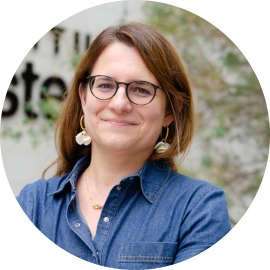
Some mosquito populations are capable of transmitting viruses to humans very effectively, while others are much less so.
The natural diversity of mosquitoes is incredible, and it can help us understand why some resist viral infections while others are susceptible to them.
The members of her team work with people who are active in the field, either in the Pasteur Network or in the French Research Institute for Development (IRD). They receive dried eggs, which they place in water in the laboratory. Sarah describes their "little mosquito zoo," with 25-30 colonies representing the entire tropical region.
Science with a human touch
Sarah Merkling is not simply pushing back the boundaries of science. She also wants to be a committed mentor; she is determined to support the next generation of scientists and to promote a more open, fair, socially engaged approach to science. At a time when disinformation is undermining trust in science, she feels that she has a civic mission to share knowledge, explain her discoveries and remind people that behind every scientific breakthrough lies the simple but vital goal of protecting human health.
Key dates in Sarah Merkling's career
Academic background
2025: Selected to lead a five-year group (G5) at the Institut Pasteur, Paris, France
Since January 2025: Head of the "Insect Infection & Immunity" group at the Institut Pasteur, Paris, France
Since January 2024: Deputy Director of the Department of Virology at the Institut Pasteur, Paris, France
October 2022: Recipient of an ERC Starting Grant for the "ITSaMATCH" project to study virus-mosquito compatibility at single-cell level
Since November 2020: Research Associate (CRCN) – UMR 2000, CNRS. Insect-Virus Interactions Unit, Institut Pasteur, Paris, France
December 2015: Postdoctoral fellow in the "Insect-Virus Interactions" team led by Dr. Louis Lambrechts at the Institut Pasteur and the CNRS
December 2010-September 2015: PhD student in the team led by Professor Ronald Van Rij at the Radboud University Medical Center in Nijmegen, Netherlands
Awards – Honors
2020: Awarded Springboard to Independence (S2I) funding from Labex IBEID for research into virus-mosquito interactions at the single-cell level.
2018: L'Oréal-UNESCO For Women in Science Award
2018: Prize for the best oral presentation (Virology Days, Institut Pasteur)
2017: Pasteur-Roux-Cantarini Postdoctoral Fellowship



